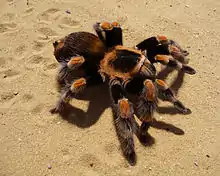tarantula
English

A tarantula (Brachypelma smithii)
Etymology
Via Medieval Latin, from Old Italian tarantola, named after Taranto, a seaport in southern Italy; from Latin Tarentum, from Ancient Greek Τάρᾱς (Tárās, “Tarās”); compare Modern Greek: Τάραντας (Tárantas, “Tarantas”); Tarantino Tarde; ultimately from Illyrian *darandos (“oak”).[1]
First recorded in English in the mid 16th century: usage for the New World species may have been influenced by Spanish tarántula.
Pronunciation
- IPA(key): /təˈɹænt͡ʃələ/
Noun
tarantula (plural tarantulas or tarantulae)
- Any of the large, hairy New World spiders comprising the family Theraphosidae.
- 1857, John Askew, A voyage to Australia and New Zealand, including a visit to Adelaide:
- Cockroaches, centipedes, tarantulas, scorpions, and mosquitoes are abundant in summer.
- 1873 May 3, “The tarantula -- an interesting native of California”, in Friends' Intelligencer, volume 30, number 10:
- In the southern portions of the State we have met with specimens of brown tarantula weighing a full Troy ounce, but these were of unusual size. The wood tarantula is the largest of all, occasional specimens weighing an ounce and a half, inhabits dead wood, is very active on a warm day, is found of sunning himself, and is quite courageous, leaping on a large lizard, with a perfect recklessness of consequences.
-
- A species of wolf spider, Lycosa tarantula, native to southern Europe.
- 1678, An Alphabetical Table of the Philosophical Transactions from March 6. 1665 to July 1677, T.:
- The story of the Tarantula's biting to be cured by peculiar Musick and Dancing, Examined in Calabria the proper place, and there suspected to be fabulous, n. 83, p. 4066
- 1723, Giorgio Baglivi, “A Disseratation of the Anatomy, Bitings, and Other Effects of the venemous Spider, call'd, Tarantula”, in The Practice of Physick, page 314:
- A Tarantula is a venemous Spider, so call'd from Tarentum, an ancient City of Magna Gracia, upon the Ionian Sea. Those who are once bit by it, are never quite cur'd of the Venom; for it revives every Year, and occasions a long Series of Evils, which would be very annoying to the Patients, if they did not take due Care of their Health by Dancing and Balls.
- 1837 February 18, “Hunting the Tarantula Spider”, in The Mirror, number 821:
- On May 7, 1812, during my stay at Valencia, in Spain, I took, without hurting him, a tarantula of tolerable size, which I imprisoned in a glass covered over with paper, in which I had made a square opening.
-
- A member of certain other groups of spiders, generally characterized by large size, hairiness, or membership with the Theraphosidae in infraorder Mygalomorphae.
Synonyms
- (Theraphosidae): bird spider, monkey spider, rain spider
Derived terms
Related terms
Translations
Theraphosidae
|
|
wolf spider
References
- tarantula in The Century Dictionary, New York, N.Y.: The Century Co., 1911.
- tarantula at OneLook Dictionary Search
- “tarantula” in Dictionary.com Unabridged, Dictionary.com, LLC, 1995–present.
This article is issued from Wiktionary. The text is licensed under Creative Commons - Attribution - Sharealike. Additional terms may apply for the media files.